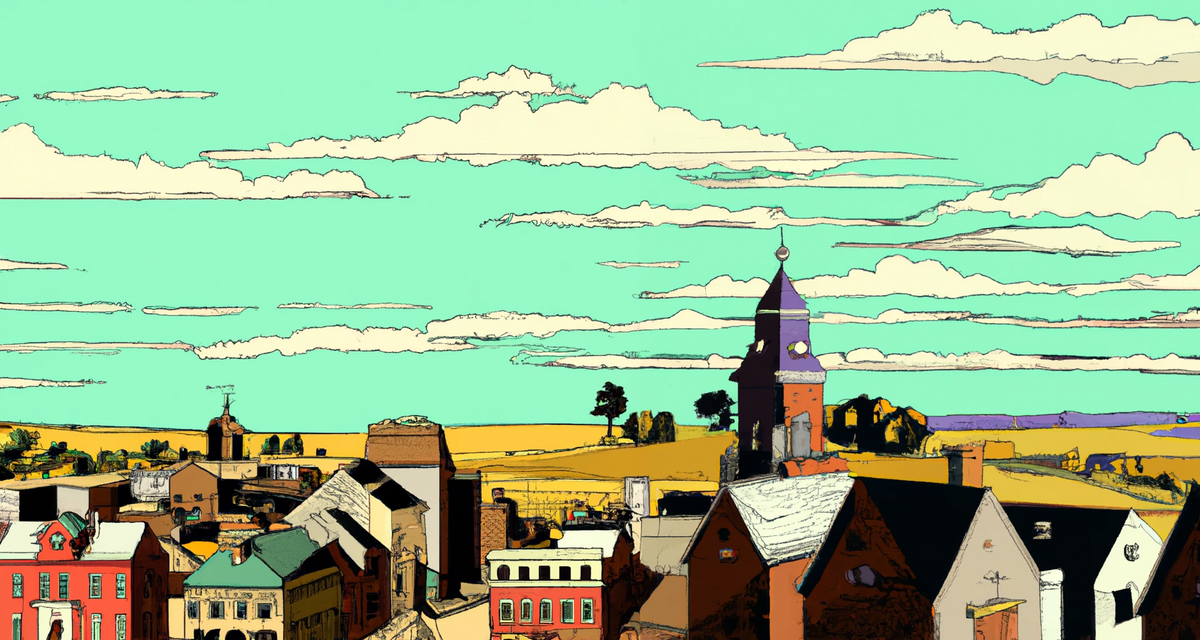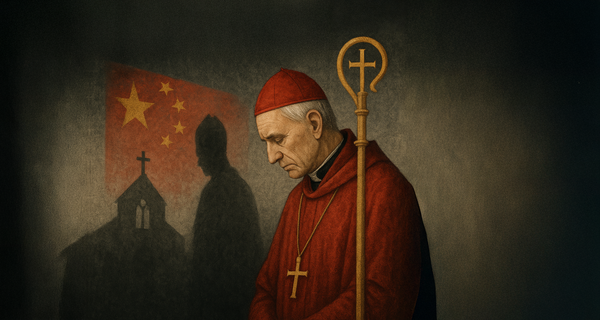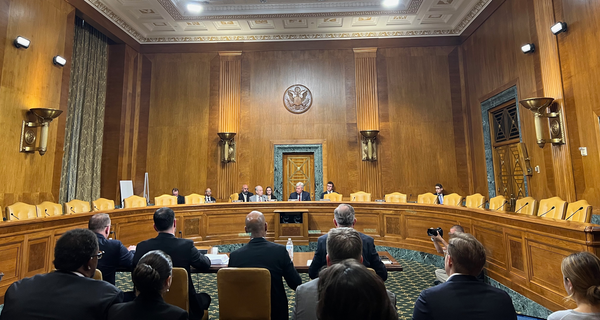Restoring A Nation In The Descending World
On a crisp October weekend a crowd of scholars, journalists, activists, and students gathered together at the Restoring a Nation conference. The peak of a chapel stood in front of them, a reminder that symbolized the spiritual heart at the center of a rapidly descending world.

On a crisp October weekend a crowd of scholars, journalists, activists, and students gathered together at the Restoring a Nation conference. The peak of a chapel stood in front of them, a reminder that symbolized the spiritual heart at the center of a rapidly descending world. Steubenville, is the ghostly portrait of a rust belt city after the steel mills close; coal dust lines the shores along the Ohio river, a faint testament of what is left of industry and production lost long ago.
In opening conversations, American political theorist, Patrick Deneen said, “The fact that our nation has places that look like they were defeated in a war should be regarded as a national scandal.” When the good of the few concentrates its value in a small number of places, you get American cities that look like “Dresden in 1945”, and as Deneen pointed out, we have come to accept this not as a form of defeat but as a kind of victory. “These cities,” Deneen adds, “have come to pass partly due to policy but also by intention and design.”
The descending world does not solely exist in small towns whose economic sectors are disrupted by the loss of large land holdings and corporatization. Take for instance the State of California, which boasts the most progressive policies the republic has to offer, but, travel to communities there and you will also see a disquieting amount of insolvency, despite the irony of being the home of extremely high value industries and possessing twice the wealth of Germany. California’s commitment to EU emissions rules and fossil fuel abandonment has the state descending to dystopian climate lockdowns and rolling blackouts. How could this happen in the most liberal and progressive place in America and how do you avoid the inevitable shipwreck?
In his keynote, “The Constitution of Imperium”, American legal scholar, Adrian Vermeule argued that the administrative state is a means by which the many have tried to protect themselves from the depredations of the few. “Administrative state structures our lives in a way we cannot imagine,” says Vermeule, “from the roads, to the scale of a whole nation down to its shires.” Whether an elite class can rule progressively in the public interest needs no further commentary, the shuttered mills of Steubenville and its collapsing ecosystem, the rolling blackouts of California, is an example of modern liberalism: mixed economy with an activist state in favor of using the state as a vehicle of promoting social change, change that often neglects the common good in favor of the good of the few.
The common good in the American tradition teaches that government policy should care about itself and its people, and the most vulnerable people of society should be protected. In the panel, “Political Economy and Family Policy After Dobbs“, Professor of Politics and Deputy Editor of American Affairs, Gladden Pappin argued the need for a core family policy. Pappin discussed a whole of society approach to supporting the main participants in a commonwealth, a charter of the rights of family, sans the trendy words filled with concepts that bring it back down to the standard liberal components. “The tendency of a highly productive capitalist society is to turn us into consumers” said Pappin. Roadmaps such as the new approach taken by Hungary can teach post-Roe America how to unite lawmaking with family policy and values.
Professor of political science, Darel Paul said we must “Break from the fundamental liberal commitments of the American welfare machine.” Paul believes the state can play a big part in pursuing the common good. The panel also highlighted the preeminent issue of the dignity of the unborn. Modern liberals focus sharply on the needs of the market, invest in the social and moral prestige of the elite, but the fact remains, that if the unborn do not have rights, then none of us have the security of life.
American columnist and Editor, Sohrab Ahmari, said “As a society we are captives of the most seductive utopias.” In his keynote “Promise of Political-Exchange Capitalism” Ahmari discussed how, “Market utopias gave rise to a 21st century society taking on the aspects of a dystopia.” It only took Canada a few years for this slippery slope to come into full view when Canadian parliament enacted a sweeping Euthanasia law that would enable them to euthanize the fiscally disadvantaged under the guise of individual autonomy.
Over the centuries families became the basic unit of production. Industrialization transpired from the disruption of craftsmen and farm economies, leading the communities built around these sectors to fall apart, migrate to cities, and became part of the factory industrial work complex, which created a larger working class that over time moved to city centers. Failing to preserve the customs of communal care pushed the demands of the market above care and community at home, duty to the industry, coupled by the backstop of abortion enabled women to leave their homes in order to fulfill the needs of the market.
Ahmari highlighted the potent coercive mechanism behind industry, one that serves the needs of the market above all else, and leaves “two classes sharply divided, labor power and those who controlled the means.”
The obligation of family duty versus the individual autonomy needed to fulfill market needs ensues. As French philosopher, Simone Weil says, “Rights are always found to be related to certain conditions, obligations alone remain independent of conditions, they belong to a realm situated above all conditions, because it is situated above this world.”
The obligation and duty and family rests above the many conditions of our world, and as Weil notes, rootlessness is inherent in poverty. “To be rooted is perhaps the most important and least recognized need of the human soul,” says Weil, “It is one of the hardest to define. A human being has roots by virtue of his real, active and natural participation in the life of a community which preserves in living shape certain particular treasures of the past and certain particular expectations for the future.”
This remains true, whether cities and people are uprooted by military conquest, industrialization, or style of government. One of the primary detractions of the progressive movement and perhaps its most successful is to deconstruct and uproot , pushing a global agenda in favor of our highest obligations and duties of care.
Gladden Pappin says, “Systems in a highly productive society turns us into consumers”. The goals of family and community present a higher code of obligations with a moral, social, and political orientation. “If what the classical tradition says about human nature is true,” says Pappin, “the community is successful when all these things are secure.”
American author, Anne Hendershott suggested that a key component in the pro-life movement is to make abortion undesirable and unnecessary, namely through policy. “Married women do not statistically get abortions and unmarried women account for 86% of abortions,” said Hendershott. Strengthening families and encouraging marriage is key. Policy like the “Pregnant Workers Fairness Act” is among the reform Hendershott suggests should be explored by both partisan divides. The bill sets forth enforcement procedures that provide accommodations for pregnancy and childbirth, was introduced and passed in the House in 2021.
The strongest predictor of elevation is the family unit. Chad Pecknold explained, “The perfect society has elevating power, but that society is gone, and the fundamental premise is that the nation is wounded.”
The future is all about the ascending world and the descending world, but the more encumbered we are with global ideals, the more detached we become as communities. Just as the portrait of the rust belt city reveals the crisis of American decline, it also reveals that at the beating heart of every empire exists the fundamental need of God, family, and community, without this, the status of our human state as is lies remains rootless.
The stated goals of good government and common good jurisprudence over the years has been justice, peace, and the economy of abundance. We should remain skeptical of the promises of progressive policy and its goal to uproot us, and we should not flee from the challenges of higher duty and obligation. As the moral maxim goes, “hope is the last thing that dies”, is seen in cities devoured by industry, in the men sitting on the porches in a small town in Steubenville, Ohio, waiting for the mills to return.
The Restoring A Nation Conference was held October 7-8, 2022 at Franciscan University in Ohio.




